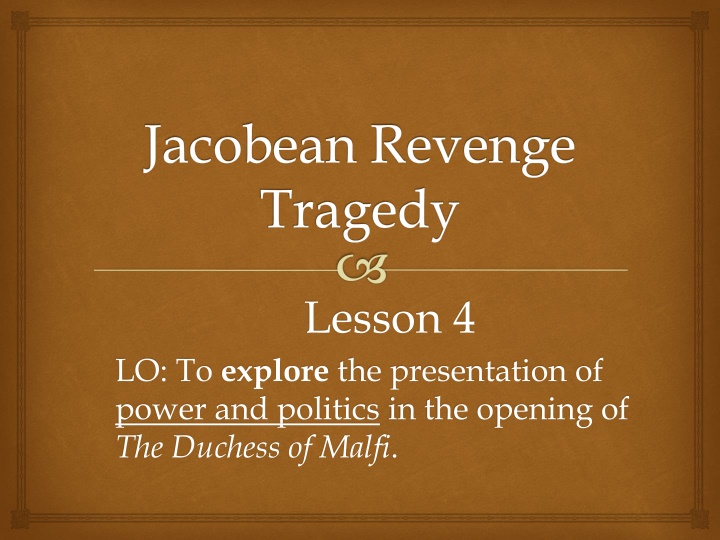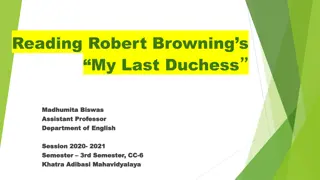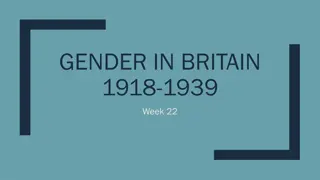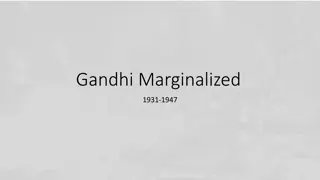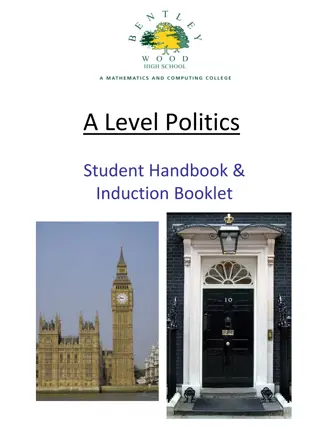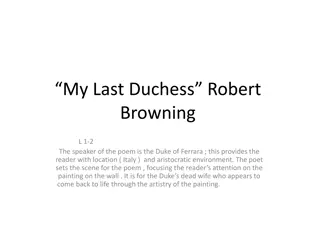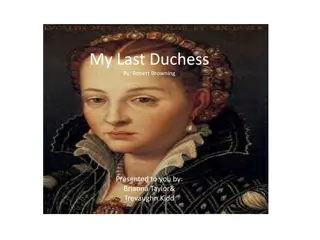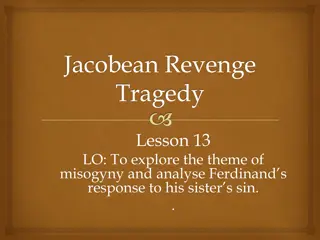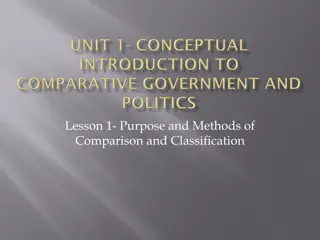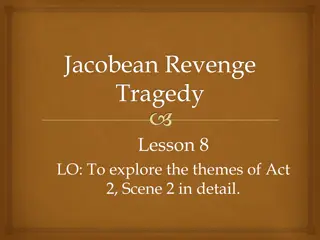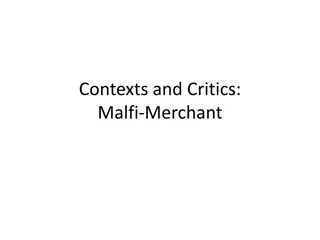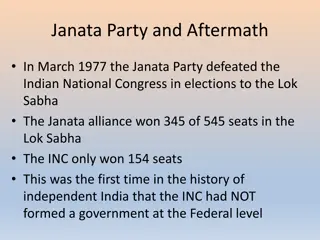Power and Politics in the Opening of The Duchess of Malfi
The opening of The Duchess of Malfi delves into the intricate dynamics of power, corruption, and politics portrayed through characters like Delio, Antonio, Bosola, and the Cardinal. The play sets the stage with contrasting discussions about different courts, highlighting themes of leadership qualities and governance. As the characters navigate noble duties, deceit, and manipulation, the audience is drawn into a world of intrigues and consequences, reflecting on the timeless aspects of leadership and governance.
Download Presentation

Please find below an Image/Link to download the presentation.
The content on the website is provided AS IS for your information and personal use only. It may not be sold, licensed, or shared on other websites without obtaining consent from the author.If you encounter any issues during the download, it is possible that the publisher has removed the file from their server.
You are allowed to download the files provided on this website for personal or commercial use, subject to the condition that they are used lawfully. All files are the property of their respective owners.
The content on the website is provided AS IS for your information and personal use only. It may not be sold, licensed, or shared on other websites without obtaining consent from the author.
E N D
Presentation Transcript
Jacobean Revenge Tragedy Lesson 4 LO: To explore the presentation of power and politics in the opening of The Duchess of Malfi.
Act 1 Scene 1 Delio Delio is Antonio s friend and the only one besides Cariola who is initially trusted with the secret of the Duchess s marriage to Antonio. He remains a faithful friend to the family through to the end of the play. He also has a history with Julia, which he d like to continue. Antonio Antonio Bologna is the steward of the Duchess s household. She falls in love with him and they secretly wed, managing to keep this hidden from her brothers and Bosola. Antonio is an honest man, a good horseman, a good judge of character, and a loving husband and father, but he is also passive and largely ineffectual in a crisis, ultimately unable to protect his family from harm. He is also rather unremarkable when compared to the impressive Duchess.
Act 1 Scene 1 Bosola is the tool through which the Cardinal and Ferdinand perpetrate most of their evil in The Duchess of Malfi. He is a malcontent, hired by Ferdinand to spy on the Duchess, for whom he serves as manager of her horses. He is an enigmatic avenger, willing to murder for hire without hesitation, while initially reluctant to the commit to the seemingly less extreme vice of spying. The Cardinal The Duchess and Ferdinand s older brother, the Cardinal of Aragon represents cold and calculated evil in contrast to his hot-tempered brother. He is a Machiavellian character, using the power of his position to torture and counter the Duchess. Ultimately, though, he loses his ability to control events, a situation Bosola exploits to kill him.
Power/Corruption/Politics The play opens with a particular model of power and an examination of politics. (lines 1-22) With your partner discuss and highlight the quotations that show this. How does Delio sand Antonio s discussion about the French court contrast with the court in Malfi? Why do you think Webster opened his play with this discussion? What does it signify? What are the qualities of a leader from Antonio s point of view?
Commentary Contrasts: noble duty with pandering which neither character likes. Vivid imagery: contrasting good vs bad government. French court held up as like a common fountain , Malfi described as poison t near the head,/Death and disease through the whole lad spread.
Governance The concept of Governance as it is explored by Webster in The Duchess of Malfi can be read as reflecting our contemporary concerns about the integrity of those who govern and the ways that they govern. Use the worksheet to consider Antonio s speech again, from the point of view of Webster s original audiences and modern audiences.
Interruption of the Cardinal After Antonio and Delio discuss politics and leaders, the Cardinal enters. P.10-12 What dramatic effect does this have? Why? What is revealed about Bosola and the Cardinal s relationship? What ideas of honesty and morality are presented? Highlight Bosola s complaints about the Cardinal what do they reveal about the two characters? Why is this significant considering the Cardinal represents the Catholic faith?
Enter Castruchio, Silvo, Roderigo and Grisolan Silvio, Castuchio (and Julia s older husband. He represents the cuckolded fool), Roderigo and Grisolan are all courtiers under Ferdinand. Ferdinand The Duke of Calabria and the Duchess s twin brother, Ferdinand boasts an impressive collection of vices: he has a terrible temper, is greedy, is lustful, and has an unhealthy obsession with his sister. He is powerful and corrupt, but as his anger over the Duchess s actions grows, he becomes more and more deranged. Once Bosola has, under his orders, killed the Duchess and two of her children, he immediately feels deep regret and then loses his mind completely. In the play, Ferdinand is often associated with fire imagery, and represents violent, choleric evil.
The Duchess At the opening of the play, the Duchess of Malfi, sister to the Cardinal and twin sister to Ferdinand, has just been widowed in her youth. Though she promises her domineering brothers that she won t remarry, she almost immediately proposes to Antonio, a decision that ultimately leads to the destruction of her entire family, save their oldest son. The Duchess is strong-willed, brave, passionate, proud, and a loving wife and mother. In the opening of the play, Antonio speaks of her incredible virtue, and though she marries him against custom and her brothers wishes, her goodness and vitality stand in stark contrast to her brothers evil. Cariola The Duchess s maid and confidant. She is the witness to the Duchess s marriage to Antonio, and thus the first to know about it. She keeps the secret faithfully, and in the end is killed by Bosola for doing so.
Critical view These images of talking and silence remind us that, although a woman's weapon is supposed to be her tongue, women always remain outside language, which, as Jacques Lacan argues, is essentially phallocentric. If this is true, the effects on women's consciousness are psychologically profound: Helene Cixous notes that "If man operates under the threat of castration, if masculinity is culturally ordered by the castration complex, it might be said that the backlash, the return on women of this castration anxiety is its displacement as decapitation, execution of women, as loss of her head. p. 366 Jankowski, Theodora A. (1990) Defining/Confining the Duchess: Negotiating the Female Body in John Webster s The Duchess of Malfi ,Studies in Philology 87(2), pp. 221-245 http://www.jstor.org/stable/4174360
Discuss Why is Castruchio s name significant to this play? Can you make links between your ideas and the comments you have just read? Highlight any quotations that show comments from the men about female sexuality. What connotations do the quotations hold? What do the men say about hierarchy and status?
Homework Visit my Blog and listen to the Oxford University podcast. Make notes on Dr Smith s podcast about The Duchess of Malfi Write a paragraph using evidence and the podcast to answer the following question: How is the theme of blame presented in The Duchess of Malfi?
